Ruby on Rails vs Node.js

John C. Maxwell once said, “Life is a matter of choices, and every choice you make makes you.” Wherever you go and whatever you do, every now and then the need to make a choice appears. Picking the right technology for developing a web or mobile app can be a tedious process since there are quite a few different frameworks and programming languages out there. And it all comes down to choosing the most suitable solution from which a project can benefit the most. Right? In this article, we are going to be comparing Node.js vs Rails (Ruby on Rails) to help you make the right decision and pick the technology that meets all your project requirements.
Ruby on Rails and Node.js Overviews
Before we dive into the detailed comparison of Node.js vs Rails, let's have a quick look at the general info about each solution.
Ruby on Rails
Ruby on Rails is a web-application framework that runs on the Ruby language. RoR is a powerful server-side MVC framework that provides developers with the convenient default structures for building applications of different complexity. Rails is based on the convention-over-configuration concept meaning that a programmer is provided with default conventions that make programming a lot simpler and save lots of time and work. The principle helps with reducing the number of decisions needed to be made by developers allowing them to reuse the components of the code. As a result, the Rails apps are built quite fast and with fewer risks for a coder.
Node.js
Node.js is a fast and flexible open-source runtime environment that is used for building powerful server-side applications. This cross-platform solution is built on Chrome’s V8 JavaScript engine which enables the execution of the code outside of a web browser. The non-blocking input-output model makes Node.js a perfect match if you need to build scalable real-time applications that have to deal with the huge amounts of data and run on different devices. One of the best things about Node.js is that it gives an opportunity of building the whole project by using a single programming language. The runtime environment is super flexible and convenient to work on.
A Head-to-Head Comparison of Ruby on Rails vs Node js
Performance
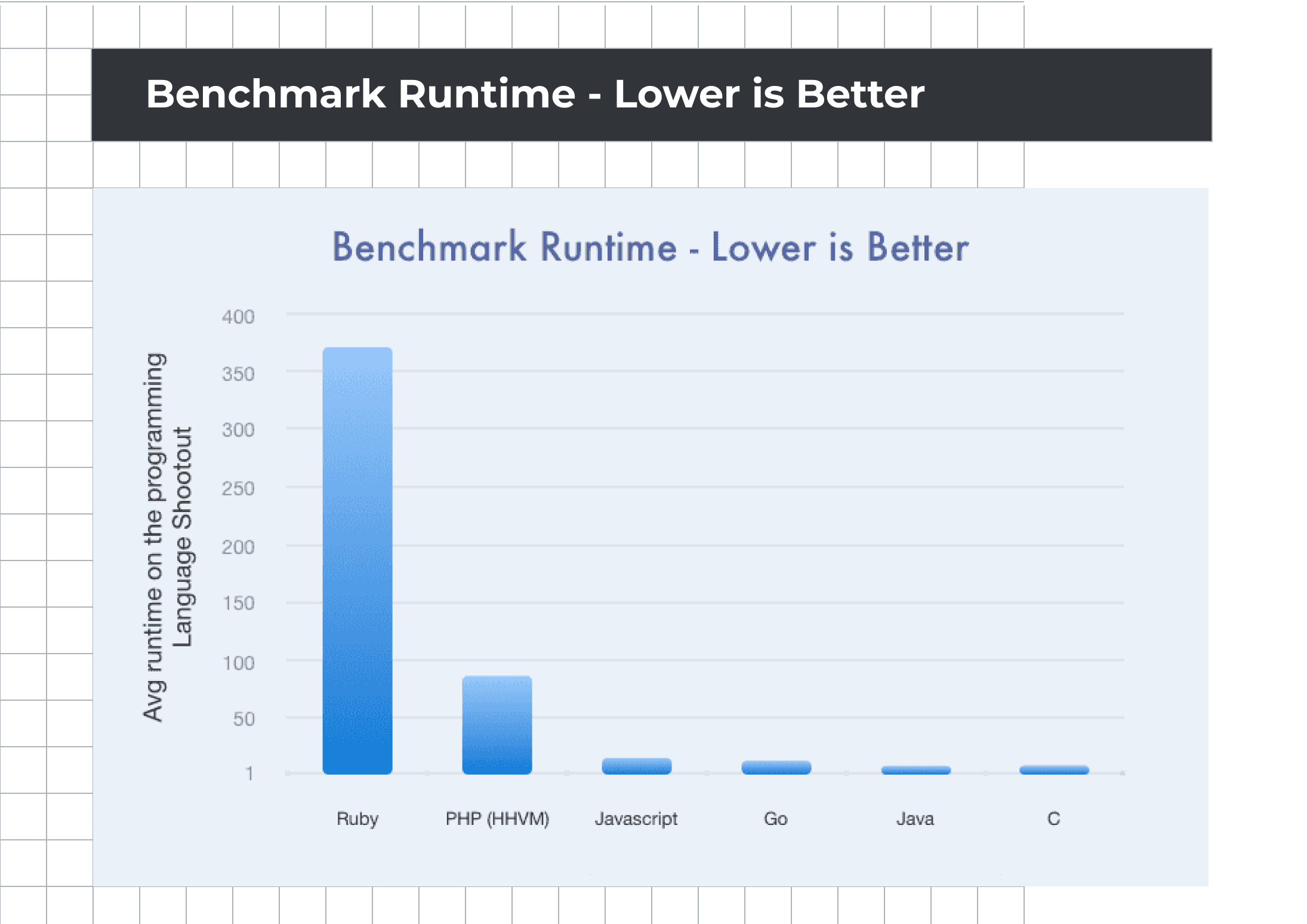
Speaking of the speed of performance, Node.js has an upper hand without a doubt. The software uses the V8 JavaScript engine by Google which is one of the fastest at the moment. Apart from this, Node.js developers can write high-speed async code that is backed up by non-blocking I/O operations. All of this allows Node.js to demonstrate the 20-times faster performance than Rails.
RoR offers something close to the asynchronous code as it supports the dynamic AJAX interface, but coding experiences are significantly slower. Thus, as compared to Node.js the overall Ruby on Rails performance is much slower.
As one can tell from the infographics above, which shows the average programming language runtime, Ruby seems to lag behind Node.js big time since its runtime is the slowest.
Scalability and Flexibility
Scalability and flexibility are the two important factors when it comes to choosing a web development tool. From the perspective of both factors, Node.js is ahead of Ruby on Rails big time. The applications built on Node.js are easy to grow – the amount of Node.js processes is countless and can be created by the combination of Node clusters and workers. Thanks to the scalability opportunities a number of big companies have already switched from RoR to Node.js.
Flexibility is something Node.js really shines in allowing developers to show their creative side and do all these things out of the box. With Ruby on Rails, on the other hand, you are only allowed to do things in a certain way, which leaves you little room for creativity and app uniqueness.
Development time
When comparing the time spent of coding there shouldn't any disagreements regarding who wins the battle - Ruby on Rails is a huge productivity win. In situations when Node js developers have to look for the particular modules and follow instructions to implement them, Rails programmers get to complete tasks faster and easier thanks to the user-friendly programming language and the convention-over-configuration approach. So, if you aim for the fast delivery of your app, Ruby on Rails will be a better option.
Popularity
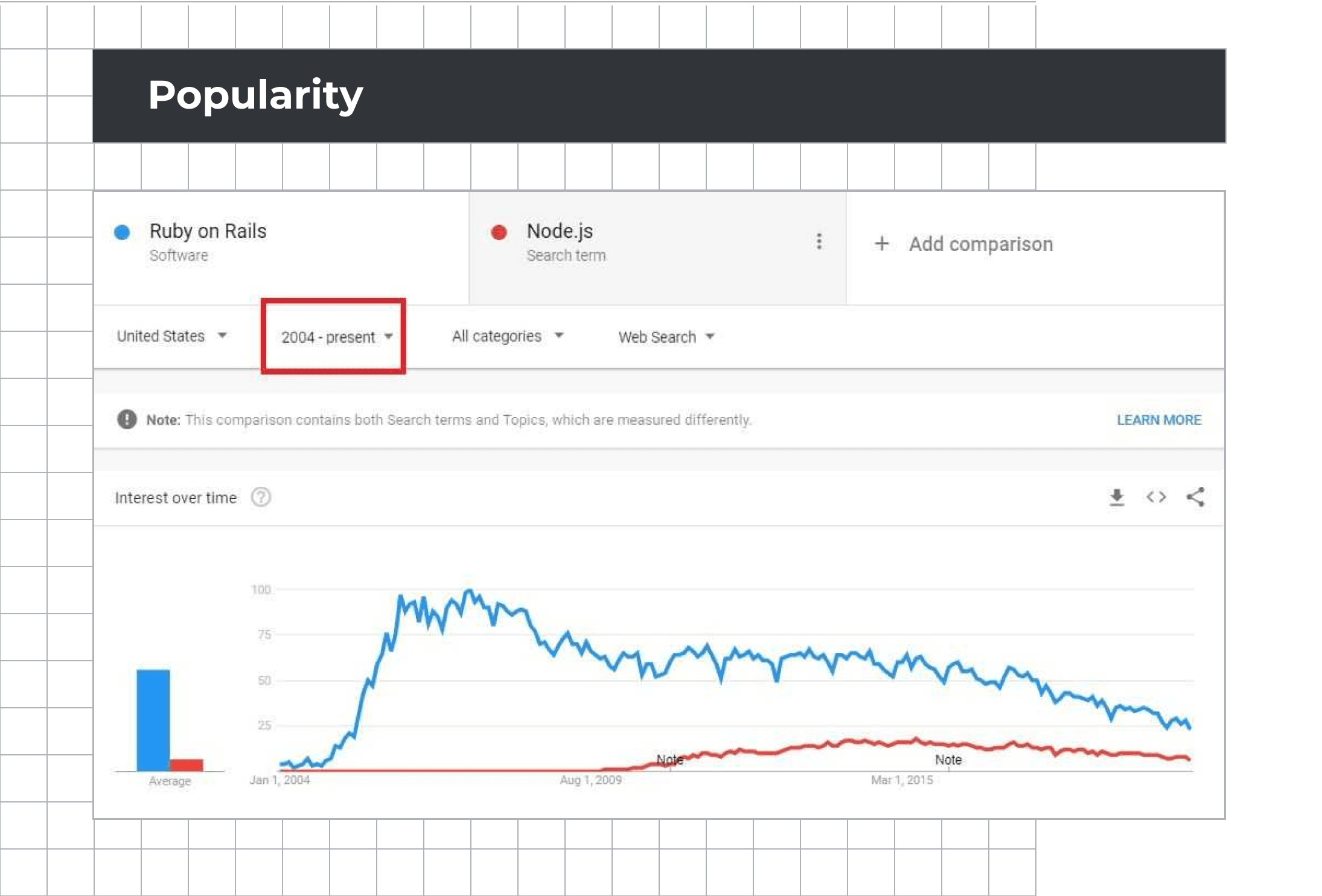
When it comes to deciding which solution, Ruby on Rails or Node.js, has a bigger fan-base, it is hard to give an answer. Both technologies are quite popular in the world of web development and they both are considered to be worthy alternatives to such solutions as PHP, .NET, and Python. As we can see, when the world first saw Ruby on Rails back in 2004, the framework quickly became popular thanks to its comprehensive and easy-to-understand syntax. As time went on, the hype around Ruby on Rails began to diminish, nevertheless, it still remains one of the most preferred frameworks. Github, Twitter, AirBnB, Shopify, and SoundCloud are just a few examples of Ruby on Rails applications that have millions of active users.
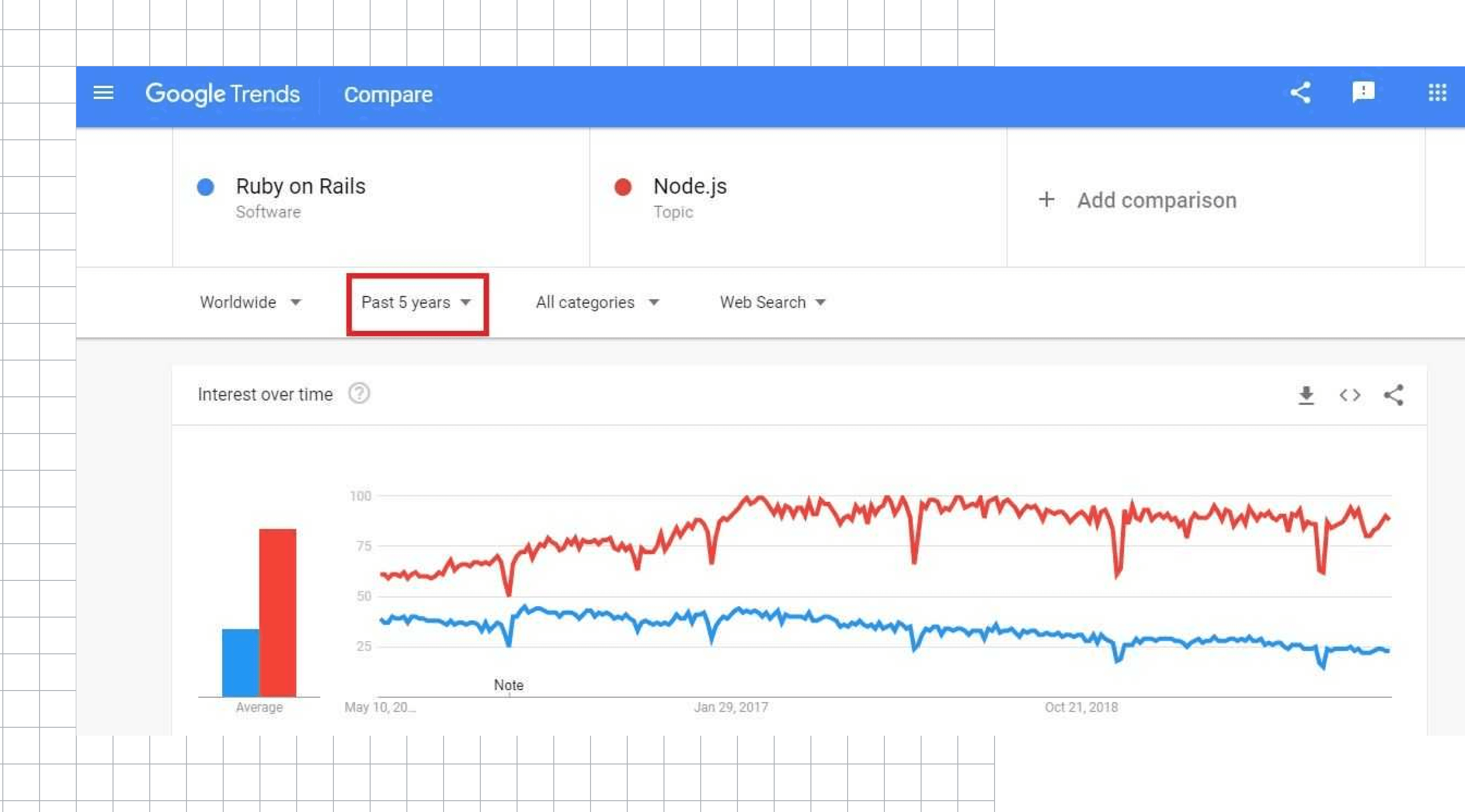
Node.js is somewhat younger than Rails. The first stable version was released in 2009. Over the past 5 years or so, Node.js managed to overrun Rails in terms of popularity and become the ultimate choice of a number of big companies such as Uber, PayPal, Netflix. It is worth noting that there a few companies that have switched from RoR to Node.js because of the scalability and top-notch performance of the latter. LinkedIn is the most prominent example. So, in terms of popularity, Node.js is definitely in the lead at the moment.
Job Trends
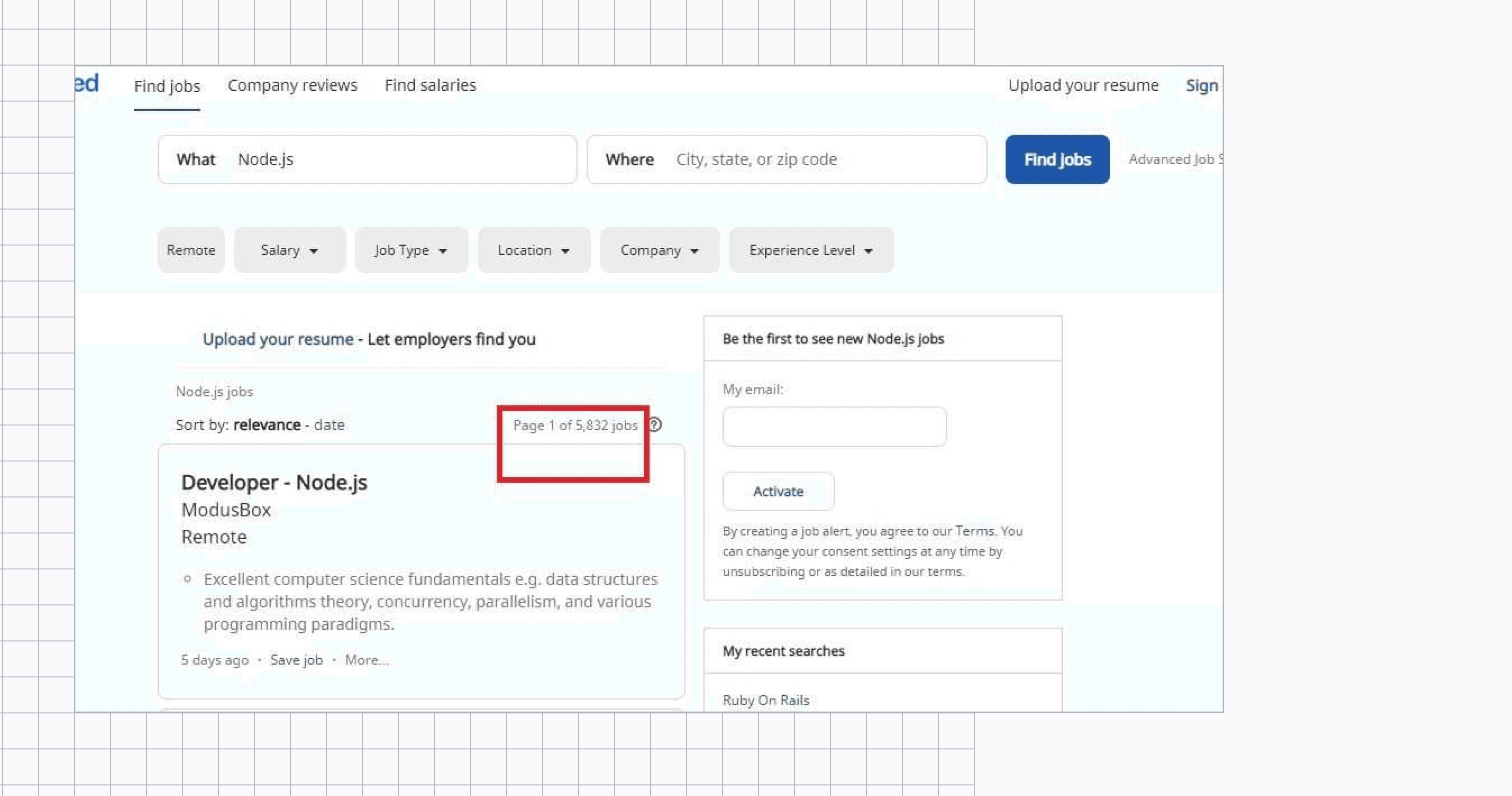
If to take the current situation on the job market, Node.js developers are in higher demand than the Jedi whose force is to write top-notch apps with Ruby on Rails. While it seems that to find a Node.js developer is an easy-peasy task since more than 5,000 job offers are presented on websites like Indeed, finding an experienced one is always problematic.
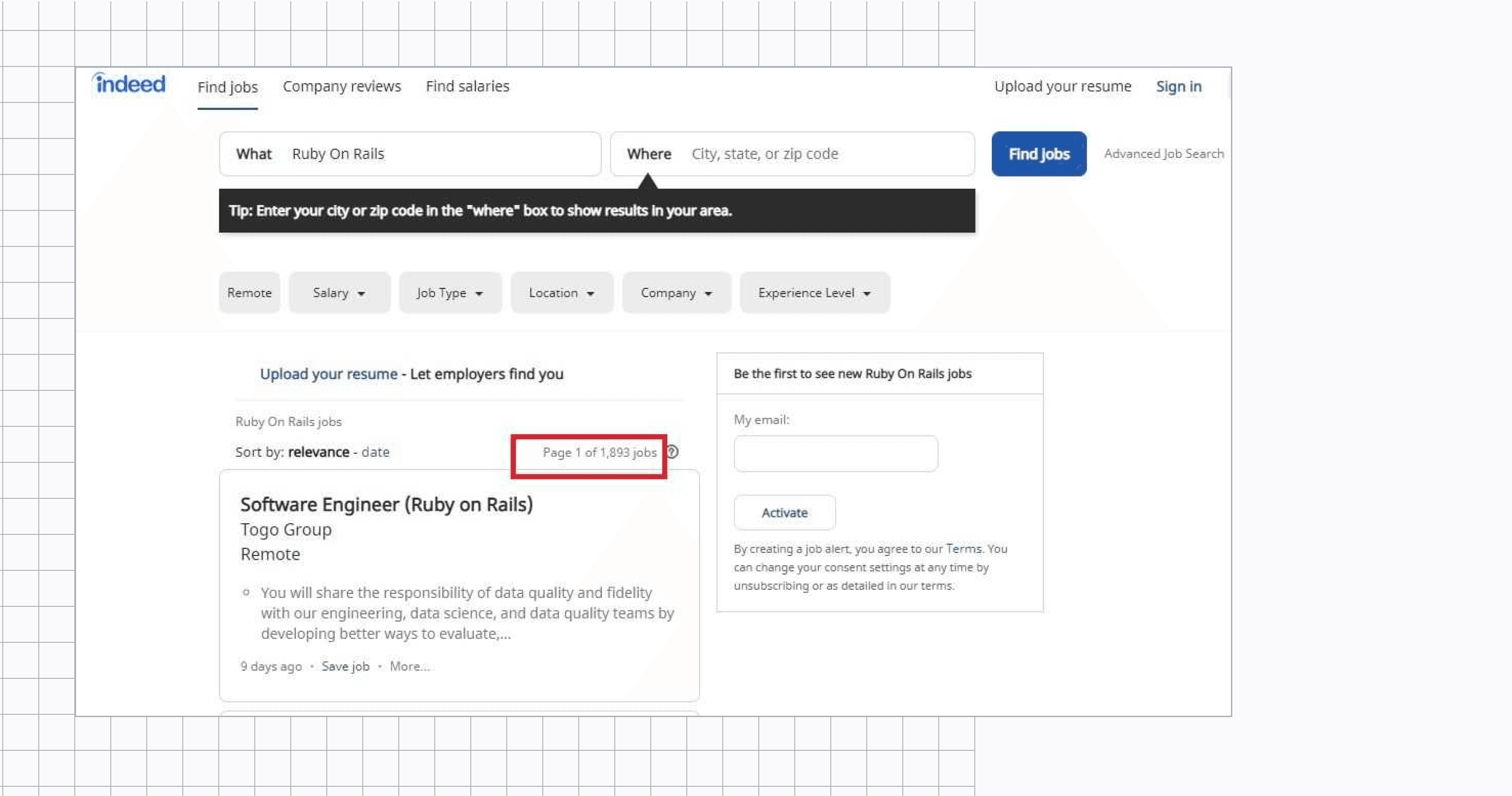
As for Ruby on Rails developers, things are even more challenging. The job postings for Rails specialists are half as many as for Node.js. And again, it is not an easy task to find a Rails developer with a decent background.
Node js vs Ruby on Rails: Pros and Cons
While comparing Node.js vs Rails, keep in mind that the first one is a runtime environment, NOT a framework as Rails. However, we still believe that it makes sense to put these two in one line. Each technology has its own unbeatable strengths that deserve attention. At the same time, there are also weaknesses that can't be ignored. All in all, let's have a look at Ruby on Rails vs Node.js advantages and drawbacks.
| Pros | |
|---|---|
Ruby on Rails
|
Node.js
|
| Cons | |
Ruby on Rails
|
Node.js
|
Conclusion
Answering the question regarding which technology is better, Node.js or Rails, we'd say that it is a draw. Since Ruby is a framework and Node.js is not, it is not quite fair to put them in the face-to-face comparison and pick a winner. Each technology offers unique solutions, interesting approaches, and useful features. As well as that, both solutions have got a number of weaknesses that may stand in the way of picking them.
When to choose Node.js
If your task is to build a real-time application that requires processing a big number of concurrent connections, Node.js is the perfect match. This can be any application that demands fast page load and intense input/output operations such as a streaming or gaming app.
When to choose Rails
On the other hand, if your project doesn’t require a lot of real-time functionality, Ruby on Rails is the way to go. Besides, it is a perfect option if you are limited in time and budget since the framework allows coders to move at a decently higher pace. Ruby on Rails will also be an absolute win-win option if you need to create a database-heavy project.
And the bottom line is...
Before choosing a web development tool, take into account the goals and project requirements first. Moreover, if you still hesitate about what to choose, Ruby on Rails or Node.js, our team will gladly provide you with necessary technical help. Feel free to reach out to us.
Looking to hire developers?



